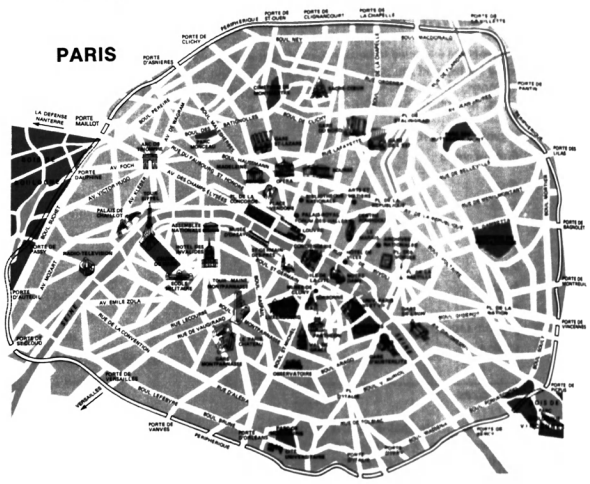24.4: Expressions and Topics Used and Considered
- Page ID
- 142411
Expressions and Topics Used and Considered, (Chapters 4-6)
Asking where something is.
Replying with a definite location ("on X," "in X," etc.).
Replying with "there it is/here it is," and pointing.
Asking "yes/no" questions about where something is.
More generally, asking how to go to some location (in Paris).
Answering such a request.
Stating who owns or "has" something.
Asking what someone's profession, nationality, religion, or occupation is.
Asking and comprehending (orally) telephone numbers, prices, other quantity questions.
Weather.
Days of the week, seasons, months.
Describing past conditions, states; recounting what one used to do at some past time.
Stating what one did, what happened, at some time in the past.
Irregular Verbs and Model Verbs presented in Chapters 1-6
Students are expected to be able to produce the present tense forms, the imperfect tense forms, and the passé composé of each of these verbs. See verb tables for all forms. The models for "regular" -er and -ir verbs are listed first, then irregular verbs, in alphabetical order.
regarder (-er verb)
finir (-ir verb)
aller
avoir
boire
écrire
être
faire
pouvoir
prendre (apprendre, comprendre)
vouloir
Exercices
1. (Refer to the dialogues and the related exercises you did in Chapitres 4 and 5.) Using a métro plan and a guide to monuments and places of interest, write two dialogues. First, assume you are at a hotel near the Raspail stop on the subway and that you are asking the hotel clerk how to get to the following places: la Comédie Française (le Théâtre National), le Musée d'Orsay, le cimetière du Père Lachaise, plus two places you choose yourself. Ask the appropriate questions, give the answers, and include one or two comments for each location. Second, assume you are a guide on a walking tour of the Ile de la Cité and nearby locations on the left bank. Choose your own itinerary, then direct and inform your tourists, using the vocabulary we have provided.
2. Imagine you are showing photographs of your family and friends to a group of new friends at a hostel in France. Tell them two or three things about each person. Describe at least five people.
Example. Voici mon oncle. C'est le frère de ma mère. Il est avocat et il est très riche. Mon père n'aime pas mon oncle, mais il est souvent chez nous.
Do not make it any more complex than that!
3. Now imagine that the other people at the hostel have taken out their family photographs Ask at least six questions about the people one of your friends points out. following these models:
C'est ton frère? Quel âge a-t-il? Ta sœur habite à Paris? Tiens! Je vais à Paris demain. Quel est son numéro de téléphone?

4. Read the following poems, following a pattern similar to the one we recommended for reading prose passages: work on one poem at a time, read it quickly two or three times before attempting to determine meanings oi words you don't know, and check the dictionary only when necessary. It is particularly important when working with poetry to read the whole poem all the way through a number of times.
La Belle Saison
| À jeun0 perdue glacée0 Toute seule sans un sou Une fille de seize ans Immobile debout Place de la Concorde A midi le Quinze Août |
0 fasting (i.e., without food for some time)/frozen |
| Jacques Prévert, Paroles, p. 25 | |
L'Eclipse
| Louis XIV qu'on appelait aussi le Roi Soleil était souvent assis sur une chaise percée vers la fin de son règne une nuit où il faisait très sombre le Roi Soleil se leva de son lit alla s'asseoir sur sa chaise et disparut. |
|
| Jacques Prévert, Paroles, p. 182 |
Le Jardin
| Des milliers et des milliers d'années Ne sauraient suffire Pour dire La petite seconde d'éternité Où tu m'as embrassé Où je t'ai embrassée Un matin dans la lumière de l'hiver Au parc Montsouris à Paris A Paris Sur la terre La terre qui est un astre. |
|
| Jacques Prévert, Paroles, p. 199 |
L'Ecole des Beaux-Arts
| Dans une boîte de paille tressée0 Le père choisit une petite boule de papier Et il la jette Dans la cuvette0 Devant ses enfants intrigués Surgit alors Multicolore La grande fleur japonaise Le nénuphar0 instantané Et les enfants se taisent Émerveillés Jamais plus tard dans leur souvenir Cette fleur ne pourra se fâner Cette fleur subite Faite pour eux A la minute Devant eux. |
0 plaited straw 0 bowl 0 water lily |
| Jacques Prévert, Paroles, p. 163 | |

